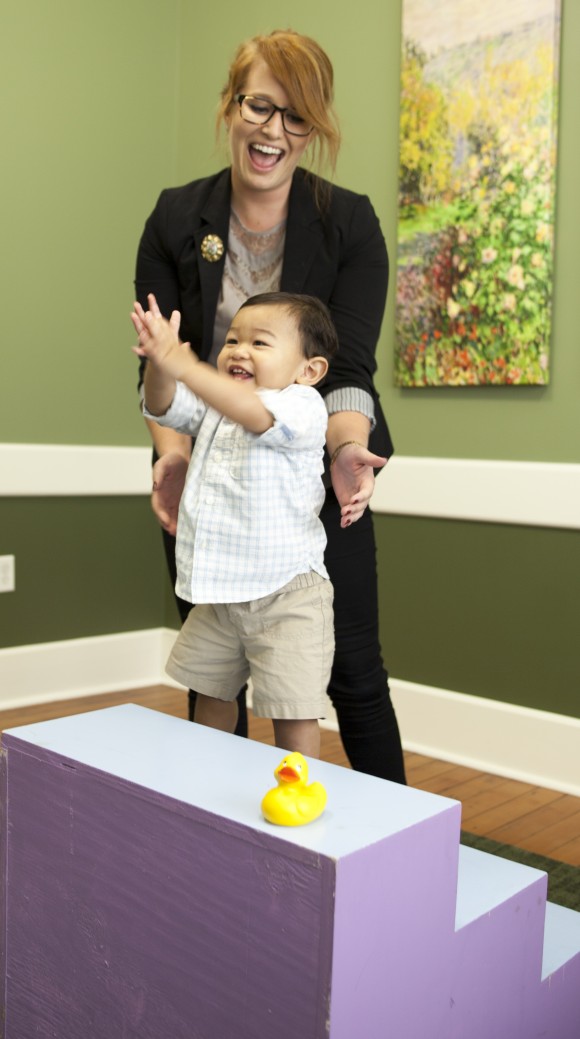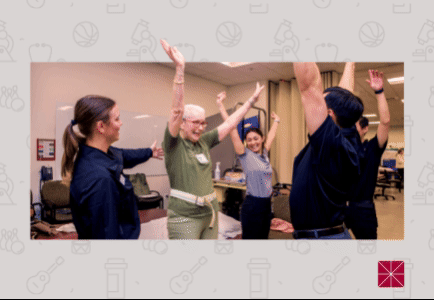Glynn was one of 14 presenters during TEDxChapmanU in June. To view all the talks, visit tedxchapmanu.com.
Laura Glynn’s thoughts seldom stray far from her research aimed at improving health outcomes for mothers-to-be. From stress hormones in breast milk to chaos in the maternal household, there’s no shortage of factors to address in Glynn’s lab at Chapman University.
Even her own two pregnancies influence how she considers moms and their offspring.

The state-of-the-art research facility is in the renovated Cypress Street Schoolhouse – the last remaining Mexican American segregated school building in Southern California. The Old Towne site is also home to the Orange Barrio Historical Society and a focal point for community education. Photo by Da Zhang (MFA ’15).
“I had this extra stress layer, because I was stressed about my stress,” says Glynn, Ph.D., who leads the Early Human and Lifespan Development Research Program, which makes its home in a historic Old Towne schoolhouse refurbished by Chapman. “I don’t know if there was an effect; both of my kids were delivered right at term. But I certainly had lots of thoughts during my pregnancies about how my psychological experience might influence my kids.
“I think there’s a good amount of knowledge (for a mother) to have, and then to some extent ignorance might be bliss.”
Now Glynn’s children are healthy 11- and 9-year-olds, and her most blissful working days include those in which she adds to her knowledge about the interplay between biological, psychosocial and behavioral processes in pregnancy.
Glynn and her colleagues are seeking answers to some basic questions. Why do some women experience adverse birth outcomes? How does pregnancy change women — their emotional states, cognition, etc.? How does fetal and early-life experience shape the health and development of children?
One thing Glynn knows for sure: A mother is made, not born.
“Becoming a mother is a process,” she says. “There is a restructuring of the brain that happens during pregnancy and continues at least into the post-partum period, with the purpose of making a better mother — a more offspring-focused person. It’s the hormones and the interaction. Lots of important things go on between mother and child that continue this process.”
Chapman researchers, including undergraduate students, spend a lot of time studying how mothers interact with their infants. “We put them in a room, give them a set of toys and say play as you would at home,” Glynn says. “We evaluate on a number of dimensions we think are critical to mothering.”

Tests of fine motor development, such as climbing stairs, are part of the assessment given to children in Chapman’s Early Human and Lifespan Development Research Program. Photo by Da Zhang (MFA ’15).
For instance, is the mother making positive noises and touching in a sensitive way? Such sensitivity is important for child development, Glynn says. And for those who score low on sensitivity, “we know there are effective, pretty-low-cost interventions that can really enhance mothering,” she adds. “The key is to identify mothers who may need some help.”
Children are also assessed, for cognitive performance and emotional development. Glynn is particularly excited that youngsters are now being tracked through adolescence, “which means that for the first time we’re able to do a clinical diagnostic interview to start screening for things like depression and anxiety,” she says.
“There are very few cohorts like this in the world,” Glynn adds. “To be able to follow children from 15 weeks gestation to 15 years old makes this data a precious commodity.”
For Glynn, this new round of research is another reason she’s glad that as a grad student she switched from a focus on cardiovascular activity to maternal health and infant development.
“As soon as I started learning the physiology of pregnancy, I got hooked,” she says. “And I’ve been hooked ever since.”
Photo at top: Professor Laura Glynn, Ph.D. (center) with two colleagues. Photo by Da Zhang (MFA ’15).[/vc_column_text][/vc_column][/vc_row]





Add comment